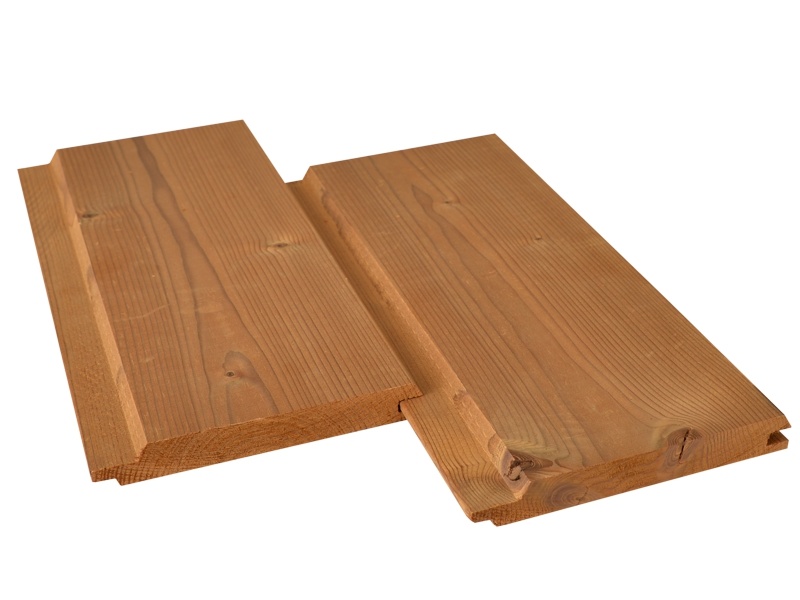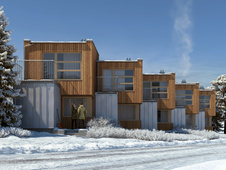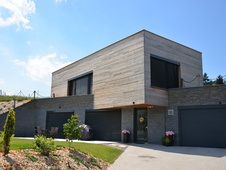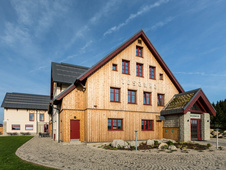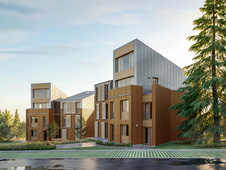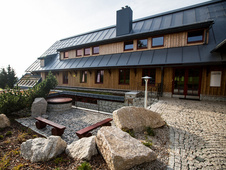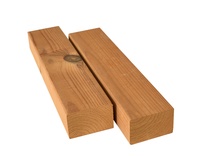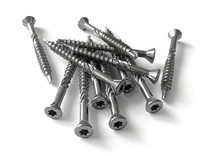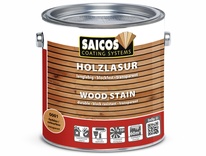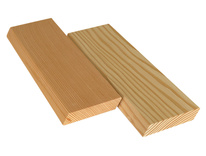Thermowood cladding Trapez 19x140 mm
Detailed Description
Thermowood Pine, Trapez cladding 19x140 mm
Specie: Pine
Botanical name: Pinus sylvestris
Origin:Finland
Size: 19x140x3000-5100 mm
Density: 400 kg/m3
Durability class EN350: 2
Thermal wood modification: original Thermowood modification-D for exterior
Grade: AB knotty
Packing: loose
Profile: Trapez T&G cladding
.jpg)
Specification points
Thermowood - original thermal modification gives to wood improved properties
It has been known for centuries that tanning a wood surface in an open fire increases its durability when used outdoors. Heat treatment of wood as such is a very old technology, known and used in ancient times by Native American tribes, who noticed that fire-tanned wood has a much longer life, resistance to rot and weather. Wood treated in this way was used, for example, for the construction of Tepee Indian dwellings. Archaeological finds have confirmed that the Vikings used this method of wood treatment for their buildings and fortifications. The heat treatment of wood was scientifically studied in the 1930s in Germany and in the 1940s in the United States. This research was followed up in Germany in the 1950s and in the 1990s in Finland, France and the Netherlands. The most intensive and comprehensive research work was carried out by VTT in Finland. Significant practical research is also carried out by YTI - Institute of Environmental Technology. The current Thermowood modification is produced by a method developed by VTT. Wood material exposed to high temperatures is protected by steam. In addition to protecting the steam, it also affects the chemical changes that take place in the wood. The result of the treatment is the creation of an environmentally friendly Thermowood product. Due to this treatment, wood darkens, is more stable than normal wood in conditions of changing humidity and its thermal insulation properties are improved. If carried out at a sufficiently high temperature, the treatment also makes the wood resistant to rot. Our company imports certified Thermowood wood from Finland.
Beware of imitations!
What is the difference between Thermowood and Thermopine, for example? Only wood produced by the original Finnish method developed by VTT and approved by the ITWA can use the Thermowood label. It is a registered trademark of the international association Thermowood. However, on the market we can find non-original products, often of unknown origin, which are not produced by the original method and must not be called Thermowood. They are therefore most often referred to as Thermo-pine, thermal wood or other similar nomenclature. If these products are produced at a lower temperature, for example 180 °C, they are not intended for outdoor use and are characterized by lower resistance than wood modified at a temperature of 212 °C. The thermal modification of 212 °C and more is intended for outdoor use.
Thermowood with Thermo-D modification, temperature 212 °C with increased resistance to the exterior
The original Thermowood has two standard treatment classes, Thermo-S and Thermo-D depending on the treatment temperature. As soon as the processing temperature exceeds 200 ° C, the properties of the wood change rapidly. The letter "S" in "Thermo-S" means "stability". The production takes place at a temperature of 185 ° C and, together with the appearance, stability is a key property for the end use. The Thermo-S class is generally intended for indoor use. According to the EN 113 classification, the thermal modification meets the requirements of class 3. The letter "D" in "Thermo-D" means "durability". Along with appearance, biological durability is a key property. Thermo-D class according to EN 113 meets the requirements of class 2. Thermowood type D is processed at a temperature of 212 ° C, it is designed due to its increased durability for outdoor use and exposure to weather conditions. We import the Thermowood supplied by us only in thermal modification D.
Durability
The heat treatment gives the wood new useful properties, such as long durability, excellent resistance to rot, decay and weather.
Color
The surface of Thermowood turns gray easily and weathering of the wood surface occurs due to weather conditions. Thermowood easily accepts the same types of surface coatings as other woods. Thermowood easily accepts and absorbs oil-based coatings. When using water-based coatings, absorption into wood is slower, so it is recommended to use substances with a longer drying time in order to achieve sufficient saturation of the wood. If you want to restore the original color of the wood, use a professional Saicos dehumidifier (new window) according to the technical sheet. Then treat with a suitable protective coating.
Properties
Observe two important factors when processing Thermowood:
Use sharp tools for the best results. Thermowood is slightly more fragile and drier than conventional wood, so cutting should be done at a lower speed than cutting normal wood. Lack of resin facilitates cutting and grinding. The dust generated by sawdust during processing is really dry and fine, so it is recommended to use respirators. Work areas should be equipped with their own ventilation system to remove dust.
Thermowood's heat treatment process can increase the susceptibility of wood to cracking. There may be slight differences in the width of the wood, due to the different expansion of the wood during moisture balancing, between the radial and tangential growth of the wood. In wood that is exposed to outdoor climatic influences, cracks, deflection of the so-called troughs, torsion and rotation, cracks and fissures, especially at the ends of the boards due to drying, changing depending on relative humidity or changes in climatic conditions, small holes after wood damage insects. The above characteristics of wood cannot be considered a defect.
Always pre-drill the screw holes to prevent the material from cracking. The use of self-tapping screws without pre-drilling is not recommended. It is recommended to use low threaded screws. It is very important to use countersunk stainless steel screws and fasteners, for outdoor outdoor use or for use in humid environments.
Knots and other natural wood signs
Knots, healthy or partially intergrown, cracks around the knots, marrow run-in, resin channels, marbling and other natural features are an integral part of the wood.
Storage
When storing wood before and during installation, make sure that the wood is not exposed to direct sunlight, rain, snow or other external influences. It was well covered or best stored in covered unheated areas, with relative humidity values identical to outdoor humidity. At the same time, sufficient interleaving of the wood with spacers was ensured, enabling air ventilation and prevention of the formation of mold. Failure to follow these recommendations may result in twisting, deformation or other changes to the wood during storage.
Download
Demand
We will show you our products before purchase in our warehouse. Wood is a natural material, each piece is a unique original. The supplied wood will be different from the displayed photos and samples.
Call us on +420 220 879 443
Payment options:
- Cash or a card at the store
- Cash on delivery (you pay when picking up the goods to the courier in the Czech area only )
- By bank transfer (we will send the goods immediately after the amount has been credited to our account)

